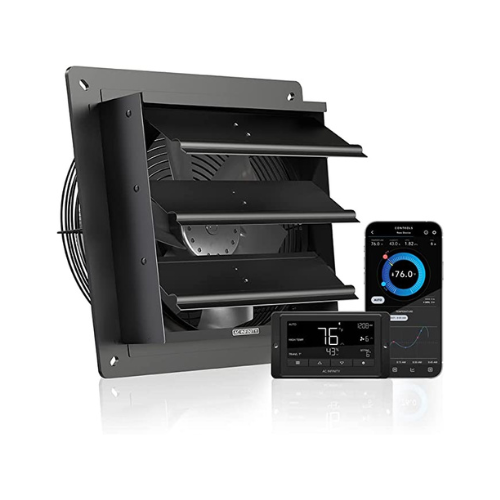Will a dehumidifier cool a garage?
3 Key Takeaways:
🚀 A dehumidifier can help regulate the humidity level in a garage, but it cannot throw in cool air to manage extreme heat or hot air to handle the cold.
🚀 High humidity levels can trap heat and cause structural damage, rust, mold, and mildew growth in garages.
🚀 A dehumidifier can help remove excess moisture from the air and maintain a healthy humidity level.
It is difficult to pull through any task when you feel hotter under high temperatures and high humidity levels. A hot garage is no good. We often neglect the importance of removing hot air from a hot garage. A garage that is under constant exposure to either high moisture levels or hot air is on the path to damage. An unbearably hot garage with high humidity levels or high temperatures will pave the way to structural damage.
In this article, we will discuss how and why having a dehumidifier in the garage for removing hot air is a good idea. We will discuss how much moisture level and humidity levels must be maintained inside a garage and how to cool your garage naturally. Let us get started!
Can a dehumidifier cool your garage?
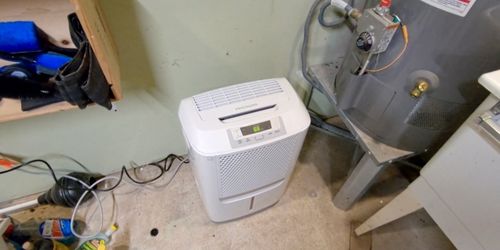
Keeping a garage cooler using a dehumidifier in the garage is possible. However, you must be clear on the fact that even the best garage dehumidifier cannot throw in cool air to manage the extreme heat or hot air to handle the cold. Having a dehumidifier in the garage will ensure that the space is regulated with the ideal humidity level.
High humidity levels are a great source to trap heat. A humidity level that is higher than the ideal level is a threat to any space. Excess moisture from the air must be removed to ensure that more heat does not get trapped in the air. The only best device to remove moisture from the air and keep the stuffy air away is a dehumidifier.
In order to help to maintain a healthy humidity level, prevent stuffy air, improve air quality and fresh air, and protect electronic equipment, furniture, etc., you just have to have a dehumidifier in the garage. Getting the right pint dehumidifier to suit the square feet area of the garage will ensure that the extreme heat conditions of the garage are also handled effectively. Investing in an energy-efficient dehumidifier will also ensure that the functioning, efficiency, and energy usage of electrical appliances are in order.
If you already have energy-efficient devices stored in the garage, they might not be able to function to their full potential if there is a high humidity level. With an increased moisture level, there are also high chances of rust, mold, and mildew growth occurring in garages. Making use of dehumidifiers will not just help to keep the heat out and safe from the influence of outside temperature to maintain the garage cooler, but will also monitor how much moisture is contained in the air.
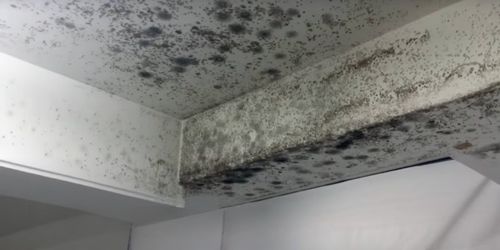
Dehumidifiers combined with the action of an exhaust fan, floor fan, ceiling fan, or even a mini split air conditioner will be able to work on cooling the garage better. An air-conditioned garage might seem like a lavish attempt but air conditioning is also recommended to protect the property within the area.
How can you cool your garage without AC?
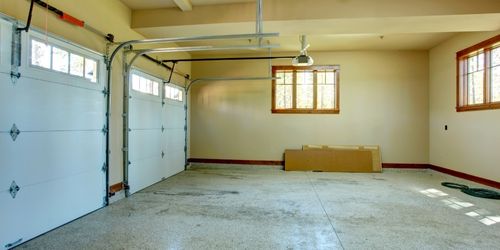
An unbearably hot garage can be cooled down only by air conditioning. If you expect to have cold air circulating in your garage and the garage air to always feel like fresh air free from heat, you must invest in a good air conditioner and the right size dehumidifier. Most dehumidifiers available in the market are capable of enhancing the performance of the air conditioner.
Here are a few techniques that work in most garages to bring in cool air into the garage and keep it cooler.
1. Garage door
One of the natural, simple, and obvious tricks to cool your garage is to keep the garage doors closed. Although we all know that a proper ventilation system is essential to maintain good air circulation, we must remember that in order to prevent the garage’s temperature from raising too high it is better to keep the garage door closed.
Opening the garage doors will depend on the outside temperature (whether it is too hot or too cold). If the garage’s temperature is lesser than the actual temperature outside, close the garage door. If you have the garage doors facing direct sunlight there are good chances that you will not feel any effect of coolness, even if there is cold air being circulated inside. Closing the garage doors will help to maintain the garage’s temperature on the cooler side.
2. Swamp cooler
Another smart way to make the garage’s temperature cooler is to try the swamp cooler method. This is not a replacement for an air conditioner, nor does it give out cool air equivalent to an air conditioning system. This is just a simple and quick way to circulate cool air when the garage air feels stuffy.
Most garages that do not have a window unit, commonly called a windowless garage design are seen using this method. This works only for small square footage or the space immediately next to the set up even in the case of a large garage. A smaller garage on the other hand might find this very useful to even remove the hot air impact that has been hitting the exterior wall.
Cold air can be circulated within a small area of the garage to influence the garage air to a certain extent by using the swamp cooler method. To set up this cost-effective method, you need portable unit fans (with a good fan speed) and a bucket of ice. The fan must be set up to blow over the top of the bucket of ice. To take this up a notch you can place the setup inside a box with a water sprinkler near the fan. This way it does not just help you cool down when you feel hotter but is also a great method to save money while getting misty cool air across the garage.
3. Parking hot car
Another cost-effective and practical method to bring down the heat in your garage is to stop parking cars that are still hot inside it. Due to energy usage, the car will be hot soon after use. When you park the car inside the garage soon after use it will radiate more heat in the garage, especially in a smaller garage.
To prevent this park the car outside in the shade to allow it to spend time cooling down before it entered the garage.
4. Declutter
The final step is to declutter. Large machinery and furniture placed in a garage will take up more space on the garage floor. These will block air circulation and make the garage floor and the entire area hotter. Declutter the space and make use of shelves and cabinets to avoid clutter on the garage floor from making it hotter.
When should a dehumidifier be used to dry a garage?
Finding a suitable pint dehumidifier to dry a garage is a helpful step. There are many instances when a small pint dehumidifier or a large pint dehumidifier would be used to dry a garage. Despite having an air conditioning system, most garages are incapable of understanding how much moisture exists in the area.
A dehumidifier can be used to dry a garage during various instances. If there is excess moisture and high humidity level that need to be taken care of, if the electric bill is suspiciously high due to the humidity, or if the garage floor is damp from flooding and a floor fan is of little help, etc. A small square feet area can make use of portable dehumidifiers. But if the garage has large square footage and has standing water it is going to need a large pint dehumidifier.
How to deal with moisture issues in garage?
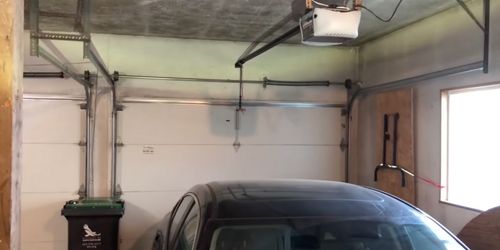
Garage air that is filled with excess moisture is hazardous to the things contained within it. It is important to ensure that the garage’s temperature and relative humidity level are balanced to a healthy limit. Here are a few ways to ensure that you keep out moisture and humidity troubles from taking over your garage.
Weather Stripping
Otherwise known as insulation, weather stripping is easy to practice and important. Attic insulation and garage insulation aim to seal off leaks and cracks that usually go unnoticed. Small outlets or inlets from a window unit air conditioner, or from the cracks of garage door in the case of a windowless garage, wall cracks on installing a mini split air conditioner, ceiling fan, gaps in the ventilation system, etc.
Garage floors and ceilings can easily become areas of moisture to seep through. Even a moderately damp garage can benefit from an energy-efficient simple portable unit to extract moisture from within the space and from seeping in through the exterior wall. Weather stripping products are readily available to seal openings from doors and windows easily.
Check Garage Door For Leakages
A garage door is easy to access for moisture to escape into the space. If your garage is always moderately damp, you must ensure that the garage door does not have any leaks in it. A ceiling fan or a simple energy-efficient dehumidifier can help to keep moisture from coming through the door even in a windowless garage.
Vapor Barrier
Another technique to seal even a moderately damp garage space is to use a vapor barrier. It is any material used to vapor proof space to prevent mold growth and increase in the humidity level. It helps to keep the excess vapor from entering the attic, walls, and ceiling.
Garage Coating
Garage floor coating is another popular step to prevent condensation. If your garage floor is sweating you can invest in a suitable garage floor coating to keep the moisture away.
Proper Water Drainage
A poorly installed water drainage system is capable of stirring up moisture damage at any time. It is important to fix any issue that one may experience with the water drainage system at the earliest. Whether it is a leak from the water draining from an air conditioning system, ventilation system, a mini split air conditioning system, or something as simple as a small drain hose from a dehumidifier. All water drainage inside and those lines going around the house or garage must also be fixed.
Make use Exhaust Fans
An energy-efficient option to remove hot air or cold air from a garage is to use exhaust fans. Whether it is too much heat or too much moisture, exhaust fans can help you with keeping it away without spiking up your electric bill.
Our Recommendation: AC Infinity AIRLIFT
If you are looking for a great ventilation system for your home you must look into the AC Infinity AIRLIFT exhaust fan. This has been designed to incorporate advanced technology to keep away heat, moisture, dust, and unpleasant odor.
The features in this exhaust fan are plentiful which makes it efficient to operate. To mention a few of them; programming with timers, grow cycles, scheduling, alarms, notifications, and Bluetooth access. The product comes with steel shutters, and aluminum blades, and is IP-44 rated to be highly resistant to liquid and dust.
FAQ Section
1. Can you run a dehumidifier in an unheated garage?
A standard dehumidifier unit will not be able to operate in an unheated garage environment. Most units are not equipped to work in low temperatures unless they have the capacity built into them. If the garage’s temperature falls below 10 degrees C you must check on the dehumidifier consistently for the functioning or make changes in the garage’s temperature.y using air purifiers.
2. Is there a dehumidifier that works well in the garage?
Yes, there are many dehumidifiers in the market that are designed to deliver seamless performance when it comes to dehumidification in the garage. The best one among them is the Waykar 70 pint dehumidifier. This model has many special features that make it an ideal choice for moisture extraction in a garage.
Waykar Dehumidifier
The 70 pint capacity of the Waykar dehumidifier is capable of covering an area of up to 4,500 square feet area. The unit comes with both manual and auto draining facilities. The water extracted from the air is stored in its 1.18-gallon water tank. The full tank indicator and the automatic shut-off feature are built to prevent spills and overflows.
Intelligent humidity control, auto restart, 24-hour timer, child lock, easy-to-use control panel, portability, sturdy build, and four air outlets are a few of the many features that make this dehumidifier a great pick for garages. This cost-effective and highly efficient unit works to keep the humidity level under control. Even a moderately damp garage will benefit from the functioning of a dehumidifier. Based on how many pints of moisture extraction your garage requires you can choose the right size dehumidifier to meet your needs.
3. Should you run a dehumidifier in an attached garage during the winter?
As aforementioned, it is not recommended to run a dehumidifier in a space that has a temperature lower than 60ºF. The reason is that the cold within the unit will freeze up. You can run a dehumidifier in a heated garage or opt for dehumidifiers that are built with a low-temperature operation facility to function in harsh winter climates.
4. In what situations should you avoid using a dehumidifier in your garage?
You must avoid using a dehumidifier unit in a garage when the garage door is not closed or when the garage is not sealed of its leaks, and when the garage is having a temperature lower than 60ºF.
5. What size dehumidifier is needed for a garage?
The size of the unit that your garage needs depends on the sq ft area of the garage and its existing levels of moisture and humidity, and signs of moisture damage, A small 30 pint dehumidifier can cover an area of up to 500 to 1500 sq ft area. Sometimes, a large unit like a 50 pint or 70 pint unit might be what your garage requires. Consult with a certified professional before you estimate the size of the dehumidifier unit that your garage will benefit from.
Wrapping Up
That’s the end of this article. We trust the article was able to clarify your doubts and concerns on how a dehumidifier will be able to cool a garage. Share with us your experiences in dealing with a hot garage and the dehumidifier unit you use to maintain a healthy temperature and humidity level in your garage.

About The Author
Olivia — a self-confessed air quality addict — is a home climate enthusiast, fresh air advocate, and someone with deep personal experience and knowledge about mold extermination. Her work was mentioned in countless notable humidity publications. Previously she was an editor at Mold Remediation.
